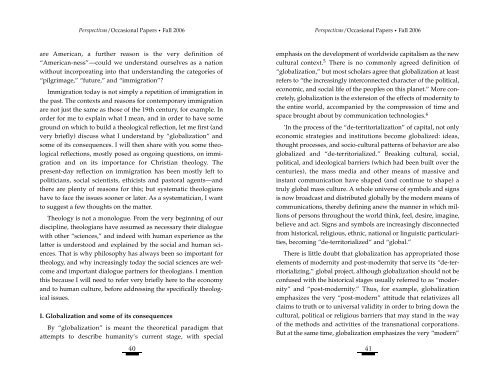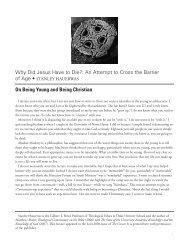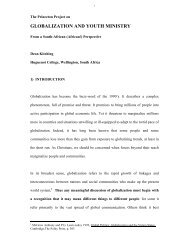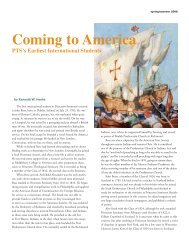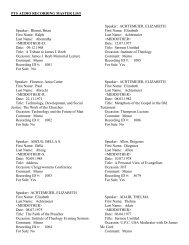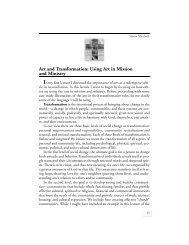P E R S P E C T I VAS - Princeton Theological Seminary
P E R S P E C T I VAS - Princeton Theological Seminary
P E R S P E C T I VAS - Princeton Theological Seminary
Create successful ePaper yourself
Turn your PDF publications into a flip-book with our unique Google optimized e-Paper software.
Perspectivas/Occasional Papers • Fall 2006Perspectivas/Occasional Papers • Fall 2006a re American, a further reason is the very definition of“American-ness”—could we understand ourselves as a nationwithout incorporating into that understanding the categories of“pilgrimage,” “future,” and “immigration”?Immigration today is not simply a repetition of immigration inthe past. The contexts and reasons for contemporary immigrationare not just the same as those of the 19th century, for example. Inorder for me to explain what I mean, and in order to have someground on which to build a theological reflection, let me first (andvery briefly) discuss what I understand by “globalization” andsome of its consequences. I will then share with you some theologicalreflections, mostly posed as ongoing questions, on immigrationand on its importance for Christian theology. Thepresent-day reflection on immigration has been mostly left topoliticians, social scientists, ethicists and pastoral agents—andthere are plenty of reasons for this; but systematic theologianshave to face the issues sooner or later. As a systematician, I wantto suggest a few thoughts on the matter.Theology is not a monologue. From the very beginning of ourdiscipline, theologians have assumed as necessary their dialoguewith other “sciences,” and indeed with human experience as thelatter is understood and explained by the social and human sciences.That is why philosophy has always been so important fortheology, and why increasingly today the social sciences are welcomeand important dialogue partners for theologians. I mentionthis because I will need to refer very briefly here to the economyand to human culture, before addressing the specifically theologicalissues.I. Globalization and some of its consequencesBy “globalization” is meant the theoretical paradigm thatattempts to describe humanity’s current stage, with special40emphasis on the development of worldwide capitalism as the newcultural context. 5 There is no commonly agreed definition of“globalization,” but most scholars agree that globalization at leastrefers to “the increasingly interconnected character of the political,economic, and social life of the peoples on this planet.” More concretely,globalization is the extension of the effects of modernity tothe entire world, accompanied by the compression of time andspace brought about by communication technologies. 6’In the process of the “de-territorialization” of capital, not onlyeconomic strategies and institutions become globalized: ideas,thought processes, and socio-cultural patterns of behavior are alsoglobalized and “de-territorialized.” Breaking cultural, social,political, and ideological barriers (which had been built over thecenturies), the mass media and other means of massive andinstant communication have shaped (and continue to shape) atruly global mass culture. A whole universe of symbols and signsis now broadcast and distributed globally by the modern means ofcommunications, thereby defining anew the manner in which millionsof persons throughout the world think, feel, desire, imagine,believe and act. Signs and symbols are increasingly disconnectedfrom historical, religious, ethnic, national or linguistic particularities,becoming “de-territorialized” and “global.”There is little doubt that globalization has appropriated thoseelements of modernity and post-modernity that serve its “de-territorializing,”global project, although globalization should not beconfused with the historical stages usually referred to as “modernity”and “post-modernity.” Thus, for example, globalizationemphasizes the very “post-modern” attitude that relativizes allclaims to truth or to universal validity in order to bring down thecultural, political or religious barriers that may stand in the wayof the methods and activities of the transnational corporations.But at the same time, globalization emphasizes the very “modern”41


